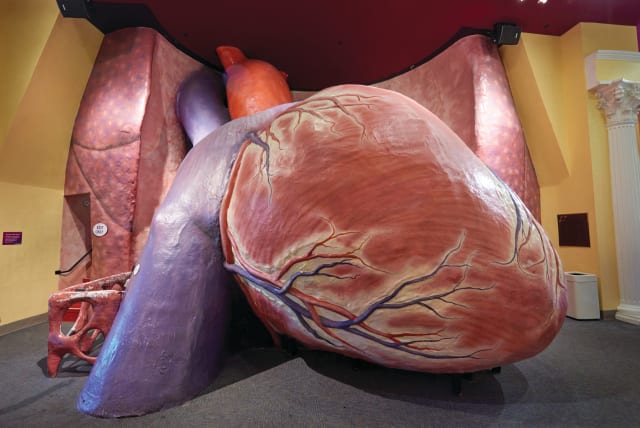'More Than We Expected': Making sense of the unthinkable - review

While nobody who hasn’t lost a child can fully empathize with the sort of trauma Robinson experienced, any reader can take something of value from the general truths that he expresses so eloquently.
From the first pages of James G. Robinson’s memoir More Than We Expected: Five Years with a Remarkable Child, we know that Nadav is gone and that his father – director of data products at The New York Times – wrote this book to help himself make sense of Nadav’s life and offer those insights to others.
“His name was Nadav; and he was one of a kind, born with a congenital heart defect so complicated that the diagnosis required three sentences to explain. From the beginning, the odds were against him; at some point, more likely than not, we’d have to bid him goodbye.”
Robinson stresses that “this book is not a eulogy, nor a meditation on grief. The thoughts I share here are less about the tragedy of a truncated life, and more about what we learned during our time together – the lucky parents of an extraordinary child.”
Making sense of a life of a child who died too soon
Nadav was the twin of Yaniv and the younger brother of Gilad.
At first, these boldly Israeli names seem a mismatch with Robinson, but the author explains that his original family name was Vorobeichik until his father’s forebears arrived in New Zealand around the turn of the 20th century.
Had Nadav been born back then, he would not have survived infancy. Modern medicine afforded him five years with his parents and brothers. These precious years of life, however, came at a steep cost to the boy and his family, as Nadav endured endless hospitalizations and procedures.
Robinson writes with beauty, clarity, and honesty about how he and his wife, Tali, cared for a gravely ill child while trying to give him and his brothers a normal and enriching childhood.
The lines between “patient” and “son,” he writes, were blurry.
“Our days remained full of routines, both medical and mundane. Taking care of these obligations – so intimidating at first – eventually gave me a deep, gratifying sense of achievement. I felt a personal satisfaction in mastering new and unfamiliar skills; doing so gave me a sense of control and agency in helping Nadav survive. Medicine had become an indelible part of our lives, part of the fabric of our family; and – whether I liked it or not – it was now a core part of my identity as a father.”
It also became part of the core identity of Nadav’s brothers, young though they were. The boys would use their parents’ “biggie bed” as a mock hospital.
“They’d drag our stash of medical supplies out of the closet, putting stethoscopes around their necks, and lie Nadav down so they could give him a checkup. Without access to sophisticated equipment, they relied on more primitive methods – lifting and dropping his arms and legs, peering down his throat, wrapping him in bandages and sheets. Nadav didn’t mind the poking and prodding. He was used to being a patient, and he enjoyed having his brothers as his doctors for a change.”
MANY PARTS of the book strike a lighter tone. Robinson relates that one of Nadav’s many prescription drugs was Sildenafil – better known by its brand name, Viagra – to avoid pulmonary hypertension. The pediatric cardiologist warned them that it would be difficult to fill the prescription, as insurance companies balk at prescribing Viagra to young children.
“So it was that I spent a lunch hour at work researching the best way to get cheap Viagra, without resorting to any of the breathless come-ons from pill pushers in my spam folder. My colleagues, ever supportive, gave me high-fives when I finally scored.”
The Robinson family enjoyed traveling, and Nadav’s medical needs did not stop them from packing up the kids and taking them to places such as the Prospect Park Zoo right in Brooklyn, but also farther afield, such as the Franklin Institute in Philadelphia, the Baltimore National Aquarium, the White House, even San Diego and Phoenix.
“Everything about traveling together – the planning, the logistics, the sheer thrill of discovering and exploring new places – made us feel happy and whole,” Robinson writes.
A later trip, the longest of them all, would turn out to be anything but happy. A thick thread running through the story is the Robinsons’ struggle with the consequences of their decision to take the family to visit Australia. In one of many passages that make More Than We Expected a keeper, he sums up this second-guessing wisely:
“We made countless decisions, large and small, in Nadav’s life. In every decision, there was uncertainty – a quiet worry that the choice may not have been the right one... I always found solace by resolving not to look back, that nothing good could come of it. The decisions of the past were unchangeable and ultimately irrelevant; with each choice, life’s alternate paths were erased, as unknowable as the future.”
Reading the book from a Jewish perspective yielded some seemingly contradictory insights. Although in many ways the Robinson children enjoyed a traditional American Jewish childhood, infused with the dominant rhythms and rituals of the Hebrew calendar, it’s surprising that Robinson never mentions seeking Jewish spiritual guidance throughout the five-year ordeal.
Nevertheless, the twins were born on the second day of Rosh Hashanah. Robinson notes that the day’s Torah reading is about the Akeida (the “sacrifice” of Isaac) “when Abraham was nearly compelled to sacrifice his son Isaac on Mount Moriah.” That Isaac ultimately was spared gave Robinson “some hope that we, too, might be spared an unspeakable grief.”
In one poignant but amusing anecdote, Robinson relates that on the final night of Hanukkah, he and Tali stood nine of Nadav’s medicine syringes in a row, “like candles, and sent a snapshot to our families with season’s greetings.”
Every time Nadav underwent surgery, and on his last night in this world, his father put his hands on the child’s head and whispered the priestly blessing: “May the Lord bless you and keep you; May the Lord shine His countenance upon you, and be gracious unto you; May the Lord look kindly upon you, and give you peace.”
However, the only time he records an incident where he sought spiritual guidance is when he asks Nadav’s Hindu cardiologist, who prayed daily for Nadav, which of her deities would be appropriate to petition. He then tapes a picture of the Hindu monkey god above Nadav’s hospital bed.
ON THE night of Nadav’s death, his parents asked for a social worker to guide them through the logistics. Finding none available, they settled for speaking with a “half-asleep and incomprehensible” child psychologist rather than accepting a nurse’s offer to call a rabbi.
“We were on our own,” Robinson writes with obvious pain.
No rabbi enters this story until the shiva, which Robinson describes as a comforting ritual that guided them “through the process of death as surely as Nadav’s doctors had helped us navigate his life.”
It struck me as profoundly sad that a Jewish family in Brooklyn apparently had no rabbi whom they felt they could approach to help them navigate Nadav’s life.
Fortunately, they were blessed with doting parents and siblings on both sides, as well as “friends old and new who came through whenever we needed it most,” and a cadre of caring medical professionals spanning four hospitals on two continents.
While nobody who hasn’t lost a child can fully empathize with the sort of trauma Robinson experienced, any reader can take something of value from the general truths that he expresses so eloquently.
- MORE THAN WE EXPECTED: FIVE YEARS WITH A REMARKABLE CHILD
- By James G. Robinson
- Post Hill Press
- 224 pages; $30
Jerusalem Post Store
`; document.getElementById("linkPremium").innerHTML = cont; var divWithLink = document.getElementById("premium-link"); if (divWithLink !== null && divWithLink !== 'undefined') { divWithLink.style.border = "solid 1px #cb0f3e"; divWithLink.style.textAlign = "center"; divWithLink.style.marginBottom = "15px"; divWithLink.style.marginTop = "15px"; divWithLink.style.width = "100%"; divWithLink.style.backgroundColor = "#122952"; divWithLink.style.color = "#ffffff"; divWithLink.style.lineHeight = "1.5"; } } (function (v, i) { });

